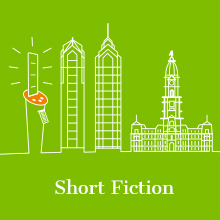"Do you like Sunshine Bear?"
Becca scowls down at her white shirt emblazoned with a smiling bear—at the long, bony finger inches away from her skinny chest.
"It's Funshine Bear," she says. She
...
[+]
At The Corner Bar read-in, a man wearing large work boots and with dark hair flopping over his forehead sits on a love seat, reading. A woman wearing a golden sweater hovers over him.
"Excuse me," the man says. "You're blocking my light."
"Oh yes," the woman says. "I see you're trying to read."
He doesn't look up. "This is a reading event."
"I know. I'm crashing it."
"Why?"
"We're too in our heads. We read too much."
"Speak for yourself."
The woman perches on the edge of the love seat. "I will. I just spent five weeks reading every American History book currently in print."
"Now you're really blocking my light."
"Did you even hear what I said?"
"No. I'm reading. Remember?"
"Right. So what is it you're reading?"
The man still doesn't look up, but holds the book slightly higher so she can read the title.
"Anna Karenina?"
He nods, still not looking up.
"Oh yeah," she says. "The woman who steps in front of the train?"
"Hey, don't spoil the ending."
"So, how is it?"
"Remarkably accessible. When someone isn't blocking my light. Why don't you go back to your People's History of the United States?"
"So, you did hear what I said?"
"Not really."
"What's happening in your book right now?"
"The young people are ice skating. They're courting each other. There's an older couple that's unhappily married."
"Ahh. Sounds intriguing."
"It is. Maybe you can get a copy and read it with me?"
"What? Get a copy of Anna Karenina? Where?"
"The library."
"The library! By the time I get there and back, you'll be gone."
"I mean the bar library."
"They have another copy?"
"They might."
"Okay," she says. "I'll check."
The woman wanders out of the living room area and into the front room with a bar running its length and bookshelves opposite the bar. Along the bar she sees a few single women wearing lipstick and sipping wine while reading books. Why had she thought the break she needed from her history project was coming to a read-in at The Corner Bar? She doesn't need any more reading. She needs conversation. As she browses the bookshelves, she hears the internal thought she'd been hearing, quite insistently, for the last few days: We are not meant to be this alone.
She scans the shelves under T for Tolstoy. There is War and Peace, the spine torn off, and someone has inked the title back on with a ball point pen. No thanks. She isn't going to turn from American history to Russian history. She remembers trying to read War and Peace as a fourteen-year-old. About fifty pages in, she'd realized that Napoleon and Bonaparte were the same guy and gave up on the endeavor.
But that standoffish guy had said Anna Karenina was accessible. She doesn't see it on the shelf. She looks around to see if anyone else might talk to her. There is a love seat by the window where three women, obviously close friends, are discussing a book they're all holding in their laps. Then there are those single women at the bar. So unapproachable. And across from the man wearing the work boots is a couch of twentysomethings, all reading.
At least the man spoke to her. It was more human contact than she'd had in weeks. She returns to his love seat empty handed.
"They don't have it."
"What?" The man actually looks up at her. His eyes are greenish-brown. "You again?"
Had he thought he had gotten rid of her? That she was so easily distracted? "Yeah, me again."
"Look. I only have another fifteen minutes to read. Can you hold your thoughts until then?"
"Yeah, okay." She pauses. "Can I sit down?"
He pats the soft couch cushion next to him.
She sits, then sinks, deep into the couch. Her sweater rests against his rough leather jacket.
He looks into the book and then back at her. "Just download it on your phone. It's in the public domain."
"Public—what? Oh, okay. I won't get kicked out for listening to it on my phone?"
He shrugs, then turns his eyes back into his book.
She knows that was probably his final word for the next fifteen—fourteen minutes now—remaining. She pulls out her phone, temporarily pushing her weight into his shoulder. The couch is as unstable as a water bed. In no time at all, she's downloaded the book, then pulls out the tin where she stores her earbuds and pops them into her ears. She leans back into the couch while her mind is transported to the Russian countryside.
The next thing she knows, the bartender is ringing what looks like a ship's bell, and everyone on the adjacent couch is standing.
She pulls out her earbuds, and the man next to her faces her.
"Well, what did you think?"
"I'm hooked."
"Wait until you get to the ice skating scene."
"I can't wait. I'm going to listen to this on the train tonight."
"You have time for a drink?"
"Yes."
The man checks his watch. "I have thirty minutes, then I'm due back at work."
She checks her watch. "It's nine PM."
He nods.
They both try to stand, bang knees, and fall back into the couch. This time, he stands first, then she does.
"My plant just got bought out by the Chinese. The woman who bought it is coming in for a tour."
"Seems late for that," the woman says, leading the way to the bar.
He shrugs. "She's got jet lag."
They sit at the bar and both order the house red.
"So, you give the tour, or is everyone expected to work around her schedule?"
"I give the tour." He glances at the two women, one on either side of them, who are still reading. One's paper napkin is smeared with bright lipstick. "I'm in maintenance. If I work tonight, and she likes me, I might keep my job."
"What kind of plant is it?"
"Paper plant."
"Paper plant," she repeats and laughs.
"What's so funny?"
"Just books. Paper plant. Can't seem to get away from the books."
"What's your job? Reading history books?"
"Yeah, I just read every history book currently used in high school classrooms."
"Why?"
"To explore bias. To see what kind of conservative bullshit is being propagated in Texas. And what kind of liberal nonsense is being pushed on kids in California."
"So, what did you learn?"
"I can't remember. It's all fuzzy. I have notes, though. Spreadsheets. Cells and cells of notes."
But what is data in comparison to human interaction, human connection? The woman can still see the scenes of people engaging in dialogue and action in Anna Karenina. How has life come to this? This isolation? Everyone existing inside their own tiny, private sphere? Living alone in studio apartments, spending days in their cubicles, passing the commute inside their earbuds. What has happened to knowing other people? To human civility? And how, in her own life, have numbers and studies come to replace socialization?
The bartender sets out their glasses, filled three quarters of the way full of mauve liquid.
The woman and the reader lock eyes. She smiles, and his lips twist into as much of a smile as he will allow.
Then, they reach for their wine.
"Salute," the man says, holding up his glass.
"Salute," she says, clinking hers into his, a little too hard.
A few drops of wine spill onto her white paper napkin. As she tastes the wine and smiles at him again, she thinks, there will need to be more of this, more of these moments.




